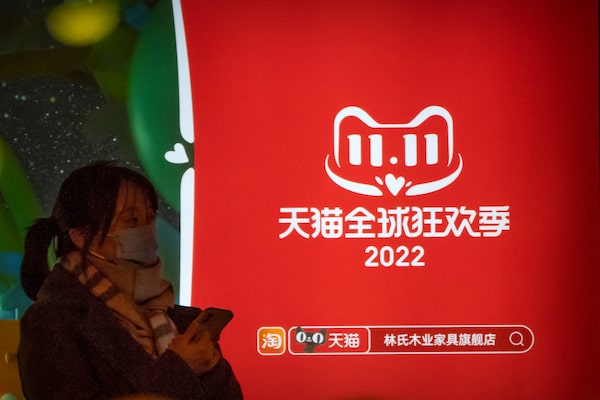
A woman stands next to an advertisement for the Singles' Day sale in Beijing, on Nov. 9.Mark Schiefelbein/The Associated Press
Alibaba Group BABA-N on Friday opted not to disclose the final sales tally of its annual Singles Day shopping festival for the first time since it started the event in 2009, only saying the results were in line with last year.
The e-commerce platform’s growth merchandising value (GMV) was widely predicted to post flat to low single-digit growth, underscoring weak Chinese consumer sentiment hit by stringent COVID-19 curbs and a sharply slowing economy.
Alibaba did not immediately respond to requests for comment on its decision after the official 11-day sales event ended at midnight on Nov. 11.
In a press release, it said the event had “delivered results in line with last year’s GMV performance despite macro challenges and COVID-related impact.”
GMV growth has been slowing in recent editions of Singles Day – the world’s biggest online shopping festival that has, despite its name, evolved into a multi-week event and is a key barometer of Chinese retail demand.
Last year’s 8.5 per cent GMV rise for Alibaba’s platforms was its lowest ever growth rate, following a 26 per cent jump in 2020. Before 2020, the festival was a one-day event.
Citi analysts said this week they were conservatively forecasting Alibaba’s GMV for the event to range from 545 billion yuan to 560 billion yuan ($75-billion to $77-billion), with growth of 0.9 per cent to 3.6 per cent.
Consultancy Syntun said earlier on Friday that Alibaba and other Chinese e-commerce firms holding Singles Day shopping events together logged a 4.7 per cent decline in sales for the first 12 hours of the final day.
The e-commerce giant has for over a year toned down hype around the event as Chinese President Xi Jinping increasingly emphasises “common prosperity” – a push that seeks to eliminate growing wealth inequities and clamp down on what the Communist Party sees as excessive behaviours.
It did not hold its usual celebrity-studded gala show this year nor any in-person media events, citing the COVID-19 pandemic.
Alibaba said its Tmall marketplace offered Singles Day deals on more than 17 million products, 3 million more than last year, with a record-matching 290,000 brands participating.
Alibaba did not say which brands were selling well but noted that sales of high-tech beauty devices such as gadgets to cool and lift facial skin had surged some 5,570 per cent from last year, while carpet cleaners and smart kitchen appliances had been selling extremely well.
Its rival JD.com did not publish GMV or sales growth rate either following its event’s conclusion but did say Apple Inc sold over 1 billion yuan worth of products in the first minute of the event’s final sales period on Thursday evening, which is marked by deeper discounts.
During the first 10 minutes of this period, turnover for 87 international beauty brands, including Estee Lauder, L’Oreal and L’Occitane, tripled from last year, it also said.
Yang Zengdong, 40, a teacher in Shanghai, said she had second thoughts about participating in Singles Day at all this year, but when the final sales period started on Thursday evening, she ended up purchasing about the same amount as last year.
“I think it’s something deep in the mind of Chinese people that if you don’t buy on Singles Day, you are missing out on an opportunity,” she said.